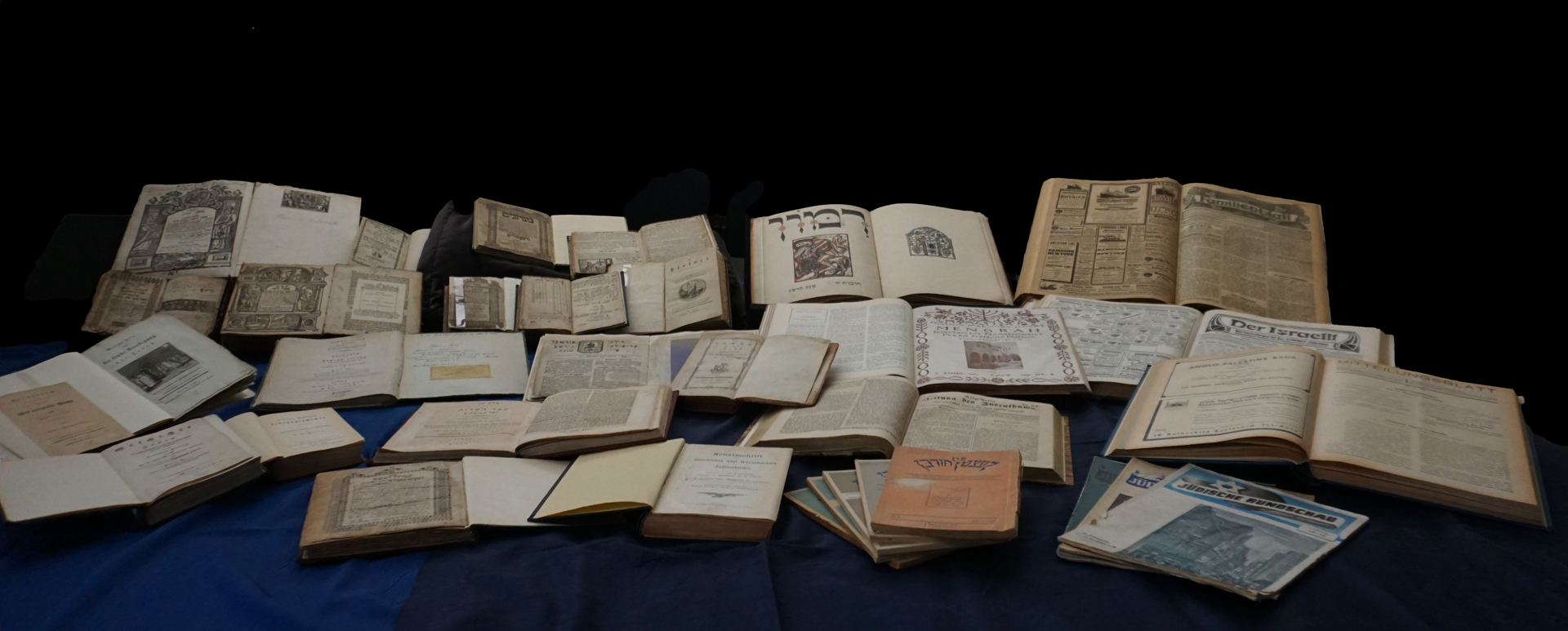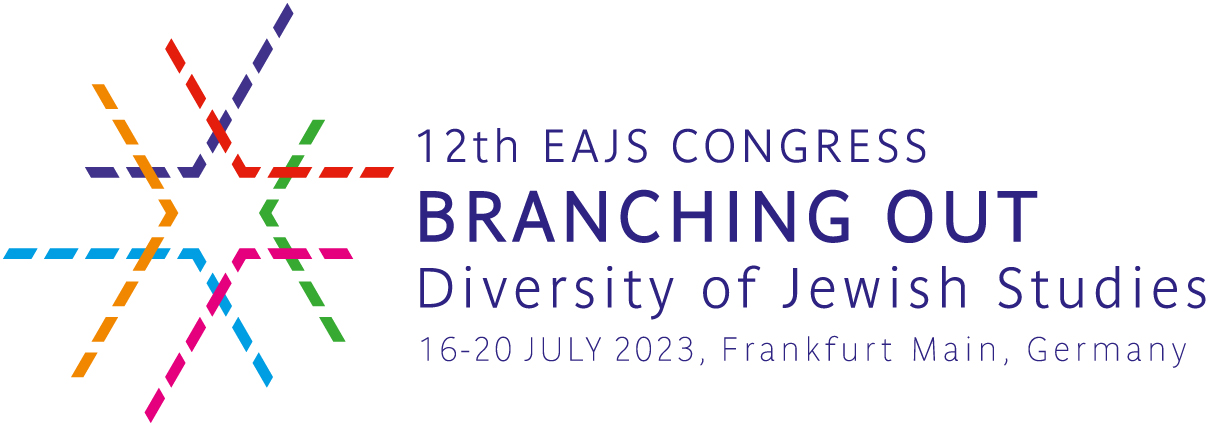Jewish Books & Jewish collections: Treasures of the University Library Frankfurt

Goethe University holds the largest library collection in Jewish Studies in Germany with approx. 350.000 items, ranging from thirteenth century manuscripts to present-day e-books. The roots of the collection reach back to the Stadtbibliothek Frankfurt (municipal library) and are closely linked to Frankfurt's Jewish history. This digital exhibition sheds light on the Treasures of the Hebraica & Judaica division at the University Library Frankfurt by focussing on three topics: Yiddish Prints, Haskalah Literature and the Historical Jewish Press.
Yiddish and Jewish-German Prints: The collection Judaeo Germanica (Jud. Germ.)
Tekle Ekvtimishvili, Kerstin von der Krone, Marie-Luise Schmidt – Goethe University
Haskalah – The Cultural Revolution of the Jewish Enlightenment
Naama Jager – Bar Ilan University
Preserving the Historical Jewish Press
Kerstin von der Krone, Marie-Luise Schmidt – Goethe University
History of the Collection
Since the mid-nineteenth century, generous donations by Frankfurt's Jewish community helped to establish the Stadtbibliothek's outstanding Hebraica & Judaica division, which by 1933 comprised about 40.000 works with Hebraica and Judaica, each accounting half of the holdings. Whereas the Judaica, publications on Judaism in non-Hebrew scripts, were subject to a catalog published in 1932 by Aron Freimann (1871–1948), the head Hebraica & Judaica division, the exact scope of Frankfurt's historical Hebraica collection is unknown — although contemporary reports suggest that the collection would offer almost everything one could wish for when in came to Hebrew books.
This outstanding collection owes its existence to the philanthropists of Frankfurt, who by the mid-nineteenth century began to donate their private book collections to the Stadtbibliothek or contributed to fundraising efforts to acquire Jewish collections. At the same time, the Stadtbibliothek saw significant expansions developing a portfolio as a research library. In 1898, Aron Freimann came to Frankfurt and played a key role in developing the collection, both through his outstanding reputation as a scholar and the leading bibliographer of his generation as well as through his ability to raise funds and gain support with the Jewish community and the city of Frankfurt.
The collections that became the foundation of the Stadtbibliothek's Hebraica & Judaica division formerly belonged to scholars and rabbis, collectors and philanthropists, among them Isaak Marcus Jost (1793–1860), Aaron Moses Fuld (1790–1847), Nehemias Brüll (1843–1891), Abraham Berliner (1833–1915), Charles Hallgarten (1838–1908), Baron Carl Wilhelm von Rothschild (1828–1901) and his wife Mathilda von Rothschild (1832–1924), Abraham Merzbacher (1818–1885), and Freimanns father in law, Markus Horovitz (1844–1910).
1933 led to the forced dismissal of Freimann as a civil servant by a city government that was headed by staunch national socialists. Freimann stayed in Frankfurt until 1939, eventually fleeing to New York, where he died in 1948. The following years, the interest in the collection remained high. Plans to sell at least part of the collection did not materialize. The library of the notorious 'Institut zur Erforschung der Judenfrage' was established in Frankfurt in part due to the holdings of the Stadtbibliothek which were well known through Freimann's catalog. During the bombardment of Frankfurt am Main in 1943–44, three-quarters of the Hebraica holdings were lost when the library burned down with altogether 300,000 books.
Regardless, large parts of the collections survived Nazi Germany, the destruction of the war and the post-war turmoil. The collection was now part of the newly established Universitäts- und Stadtbibliothek Frankfurt which, based on its significant Judaica holdings, served as the leading reference library for Jewish Studies (since 1949) and Israel Studies (since 1964) in Post-War Germany.
Since the late 1990s, Rachel Heuberger, head of the Hebraica & Judaica division at Universitäts- und Stadtbibliothek between 1991 and 2019, led the efforts to digitize Jewish Cultural Heritage and helped to establish one of the largest digital Judaica collections, drawing on the historical collections of the University Library Frankfurt. Projects like the digitization of the Yiddish prints collection, Compact Memory and the virtual Freimann collection, which is based in Freimann's catalog, eased the access to key sources of Jewish history and culture. They also raised the visibility of the collection and changed its character. Activities around the Hebraica & Judaica collection are still defined by the task to collect and curate printed texts, but data curation and subsequent services for digital Jewish Studies have become a key focus, most significantly within the context of the Specialized Information Service for Jewish Studies (FID), which is dedicated to support the German research infrastructure in the field.
Digital Exhibitions on the Occasion of the 12th Congress of the European Association for Jewish Studies
Editor: Kerstin von der Krone
Contributions: Tekle Ekvtimishvili, Naama Jager (Bar-Ilan University), Kerstin von der Krone, Marie-Luise Schmidt
Editorial Support: Aaron Christianson, Maike Strobel
Fotos & Layout: Tekle Ekvtimishvili, Mark Gondelman, David Wolf
Bibliography & Links
Judaica Division, University Library Frankfurt – https://www.ub.uni-frankfurt.de/judaica/home_en.html
Digital Judaica Collections, University Library Frankfurt – https://sammlungen.ub.uni-frankfurt.de/judaica?lang=en
FID Jewish Studies – www.jewishstudies.de
Aron Freimann, Katalog der Judaica und Hebraica. Stadtbibliothek Frankfurt am Main, Band Judaica. Frankfurt am Main 1932.
Rachel Heuberger, The Frankfurt Judaica Collection Goes Online, European Judaism, 41.2 (2008): 30-31.
Rachel Heuberger, Bibliothek des Judentums: Die Hebraica- und Judaica-Sammlung der Stadt- und Universitätsbibliothek Frankfurt am Main – Entstehung, Geschichte und heutige Aufgaben. Frankfurt am Main 1996.
- Aktuelles und Presse
- Pressemitteilungen
- Öffentliche Veranstaltungen
- Uni-Publikationen
- Aktuelles Jahrbuch
- UniReport
- Forschung Frankfurt
- Aktuelle Stellenangebote
- Frankfurter Kinder-Uni
- Internationales
- Outgoings
- Erasmus / LLP
- Goethe Welcome Centre (GWC)
- Refugees / Geflüchtete
- Erasmus +
- Sprachenzentrum oder Fremdsprachen
- Goethe Research Academy for Early Career Researchers
- Forschung
- Research Support
- Forschungsprojekte, Kooperationen, Infrastruktur
- Profilbereich Molecular & Translational Medicine
- Profilbereich Structure & Dynamics of Life
- Profilbereich Space, Time & Matter
- Profilbereich Sustainability & Biodiversity
- Profilbereich Orders & Transformations
- Profilbereich Universality & Diversity





